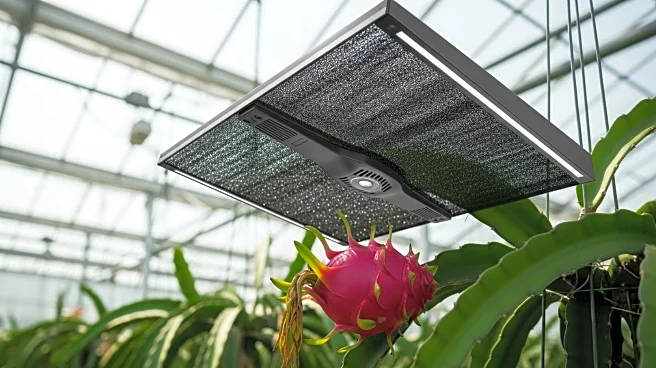What's Happening?
The ICAR–National Institute of Abiotic Stress Management (NIASM) in Baramati has developed an artificial shading technology to address sunburn issues in dragon fruit crops. Dragon fruit, a high-value horticultural crop, faces significant challenges during peak summer months when temperatures exceed 35°C, leading to sunburn injury. Traditional methods such as using green shade nets or foliar sprays have proven inadequate in creating a conducive microclimate for growth. The new technology involves using black and white shade nets with 50 percent intensity, supported by RCC poles or metal angles, to reduce canopy temperature and light intensity. This innovation has demonstrated a 90 percent reduction in sunburn occurrence and improved yield and fruit quality.
Why It's Important?
The introduction of artificial shading technology is crucial for dragon fruit farmers in semi-arid and hot-humid regions of India, where sunburn significantly impacts crop yield and quality. By reducing sunburn and disease incidence, the technology enhances photosynthesis and accelerates flowering, leading to improved fruit set and reduced pesticide use. Farmers adopting this technology have reported yield gains of 40–70 percent, translating to substantial economic benefits. This development not only supports sustainable agricultural practices but also boosts the profitability of dragon fruit cultivation, which is increasingly popular in regions like Maharashtra, Gujarat, and Karnataka.
What's Next?
The successful demonstration of this shading system in major dragon fruit growing districts suggests potential for wider adoption across other regions facing similar climatic challenges. As farmers continue to observe improvements in yield and income, the technology may encourage further investment in infrastructure to support its implementation. Additionally, ongoing research and development could refine the technology, making it more cost-effective and accessible to small-scale farmers. Stakeholders in the agricultural sector may also explore similar innovations for other crops affected by heat stress.
Beyond the Headlines
The development of artificial shading technology highlights the importance of addressing abiotic stress in agriculture, which is increasingly relevant in the context of climate change. By mitigating the effects of extreme temperatures, such innovations contribute to the resilience of agricultural systems. Furthermore, the reduction in pesticide use aligns with environmental sustainability goals, promoting healthier ecosystems and reducing chemical runoff. This advancement underscores the role of research institutions in driving agricultural innovation and supporting farmers in adapting to changing environmental conditions.









